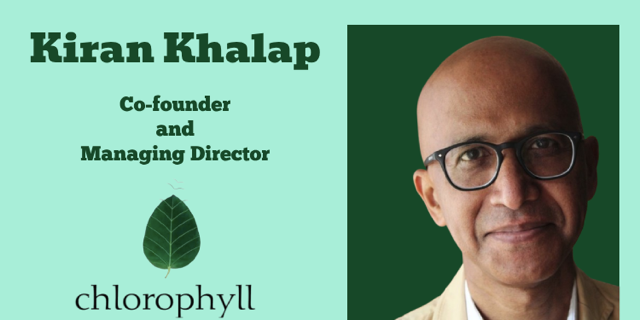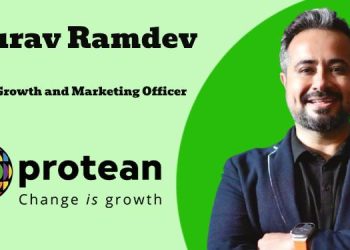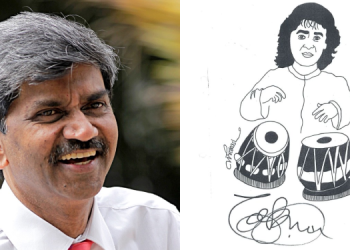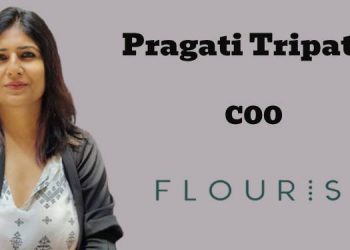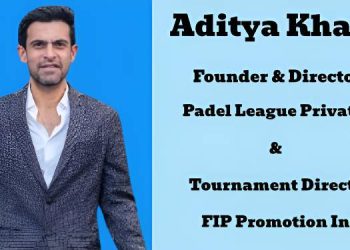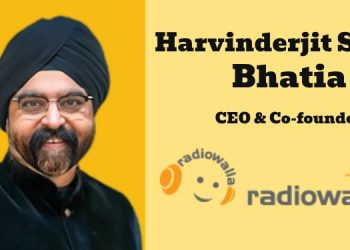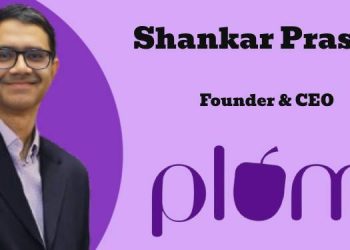Kiran Khalap is a distinguished leader in the world of branding and communication, serving as the co-founder and Managing Director of chlorophyll – an independent brand and communications consultancy.
He began his career in advertising, in 1983 as a copywriter at Lintas. His exceptional vision and creative acumen led him to become the CEO and Chief Creative Officer of Clarion Advertising. In 1999, he founded chlorophyll, channelling his expertise to revolutionise brand consultancy. A few weeks ago the agency celebrated its 25th anniversary.
As Chairman of the committee that consulted with UIDAI, Kiran contributed significantly to the development of Aadhaar, the world’s largest biometrics-based identity project, demonstrating his ability to lead large-scale, impactful initiatives. His commitment to education (His first job was as a school-teacher in a J Krishnamurti school in Benaras) is evident from his role in designing and delivering the branding curriculum for the Liverpool Business School and upGrad MBA in 2020. Moreover, he was the inaugural speaker at TED University during TED’s first Indian event in 2009 and later at TEDx Bandra in 2017, sharing his insights on creativity and branding.
An accomplished author, Kiran won the Indo-UK Short Story Writing award in 1995 and has published three critically acclaimed books: ‘Halfway Up the Mountain’, ‘Two Pronouns and a Verb’, and ‘Black River Run’. His literary work has been celebrated globally, with readings in London, Singapore, New York, and Beijing.
Kiran’s leadership extends beyond the corporate world. He is the Chairman of the Board for Protsahan, an NGO using art to heal adolescent girls, and an advisor to Together, an organization supporting individuals on the autism spectrum. He also serves on the Board of AnuntaTech, a leader in DAAS services in the US, and the Advisory Board of the Great Manager Institute. Interestingly, there is a species of spider, Thelcticopis kirankhalapi, named after him.
Medianews4u.com caught up with Kiran Khalap co-founder and Managing Director chlorophyll
- How has chlorophyll evolved in terms of its offerings and services since launching in 1999?
chlorophyll’s evolution has been driven by both internal and external factors.
Internal factors refer to team members who have been with us for several years wanting to explore new careers under chlorophyll. An example of such evolution is the chlorophyll innovation lab, born in 2016. It was led by Chitresh Sinha and has achieved three world-firsts!
We have this culture of making each employee the CEO for one month. One of the youngest CEOs suggested starting a sonic ideantity™ vertical in 2023: that’s how that vertical was born!
External factors refer to clients suggesting changes in our offerings. For example, several clients said that you create brands through an algorithmic process, but when we hand it over to an ad agency or a digital agency, there is a gap. That is how we invested in senior advertising and digital talent, who have now delivered world-class ad campaigns and digital assets, since 2017.
- The big thing that has happened has been digital. Has it forced many companies to try and reinvent themselves from a branding perspective?
Access to the internet has created cataclysmic changes for brands and in branding. Let’s take brands first, then branding. The biggest change for brands has been the explosive growth of e-commerce.
This has allowed D2C brands to disrupt existing market leaders. One of the brands chlorophyll was involved in, Atomberg, dominated the D2C space even while creating a physical distribution network of over 25,000 outlets. They grew from Rs. 5 crore per month to Rs. 100 crore per month in just four years!
Using e-commerce even Apple has been able to penetrate Tier 2 and Tier 3 towns in India, where 60% of their revenue comes from! The biggest change in branding is the ability of multiple stakeholders to influence a brand’s destiny.
Consumers as well as other stakeholders are now influenced more by peer group than by brand communication! (Read more about this here https://www.chlorophyll.in/the-4ourth-era-of-branding/)
Therefore, stakeholders are able to influence the behaviour of brands when they do not live up to their promises!
All of you are aware of what influencer, or shall we say, de-influencer, @foodpharmer has done to brands!
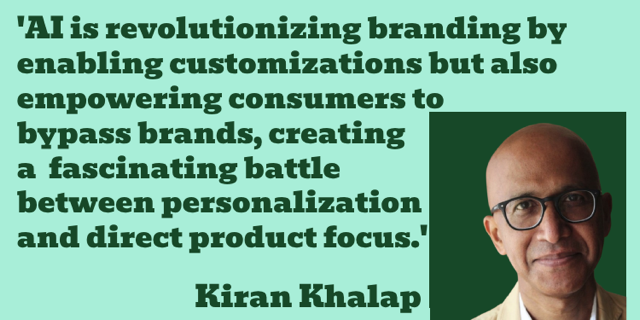
- What is the advantage of a brand consultancy versus an agency?
An ad agency creates memorable communication about brands, but branding, as we saw above, is about both communication and behaviour.
chlorophyll , as a brand consultancy, has very proven and validated models and processes to define how brands should behave. It is brand behaviour that creates customer experience. There is enough data to suggest that consumers will be loyal to brands that provide a superior experience, even if the product is not superior.
Therefore, a brand consultancy is holistic in its approach to business building.
- Is a strong understanding of a client’s business objectives key to why chlorophyll has succeeded?
Yes. Our brand line says, “Unlocking the potential of brands in business since 1999”.
Brands that we defined and articulated as early as 2005 have remained unchanged in their philosophy and its expression in what we refer to as ideantity™ (https://www.chlorophyll.in/ideantity-book/). That unchanged brand has allowed them to extended into multiple businesses…that gives us immense satisfaction
- Is the logo just a small part of a company’s brand identity?
Yes, very good question. The logo is the expression of a brand, it is not the brand.
Several iconic brands have changed their logos over time, without changing what they stand for, which is their identity. Did you know that the first Apple logo had Newton sitting under an apple tree?
- Since its launch, how has the Innovation Lab helped companies build brand relevance has?
The two biggest successes from the Innovation Lab have the Inspiration Medal and The Plated Project.
The Inspiration Medal, a world-first, was created for the Tata Mumbai Marathon in 2018. It changed the behaviour of marathoners in the country…exciting them to run the full marathon.
The Plated Project (“Art against Hunger”) has sponsored 700,000 meals for hungry children since its inception.
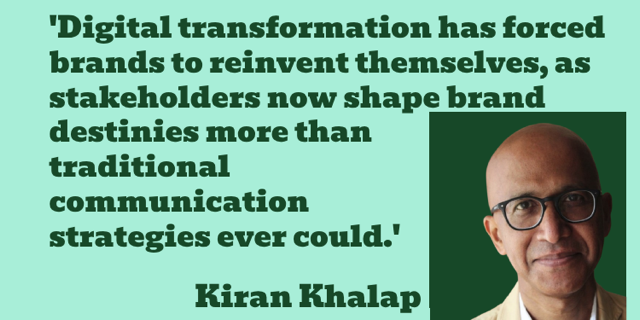
- What progress has the sports practice made so far?
The sports practice is not an internal vertical: it is symbiotic relationship with Meraki (https://merakisportandentertainment.com/). We have created brand models for sport branding together and defined strategies for sport brands like Kerala Blasters and Tamil Thalaivas.
- As the agency scales what is going to be the big challenge?
Finding the right culture fit among prospective employees is currently the biggest challenge.
- Could you shed light on chlorophyll’ five IPs like ideantity? How do they give clients the winning edge in an increasingly competitive market?
Our IPs (https://www.chlorophyll.in/ips/) create assets for our clients that find space in the ‘most expensive real estate of earth’ which is human memory.
When a brand enters the memory structure of current and prospective stakeholders, it gives it a winning edge.
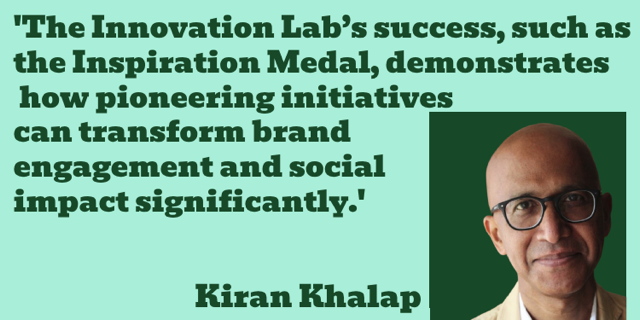
- When you look at brands that succeeded like Google, Amazon would you attribute their success to the ability to adopt a long term point of view of maybe 10 years?
Yes. Branding is always about the long term! chlorophyll has been involved in articulating one of the world’s oldest brands: it is 1200 years old!
40% of the brands that are over 200 years old come from Japan!
All of them have the same reason for success, whether Nalli Silks from Chennai (since 1928) or Tata (since 1868): adapting to change without abandoning their core values. We call them the changing and unchanging aspects of a brand
- How is AI impacting the branding industry?
Radically. AI is helping brand owners to customise their offerings to customers and consumers but on the other had, AI is also helping consumers by-pass brands and focus on products!
It’s going to be a fascinating battle!

